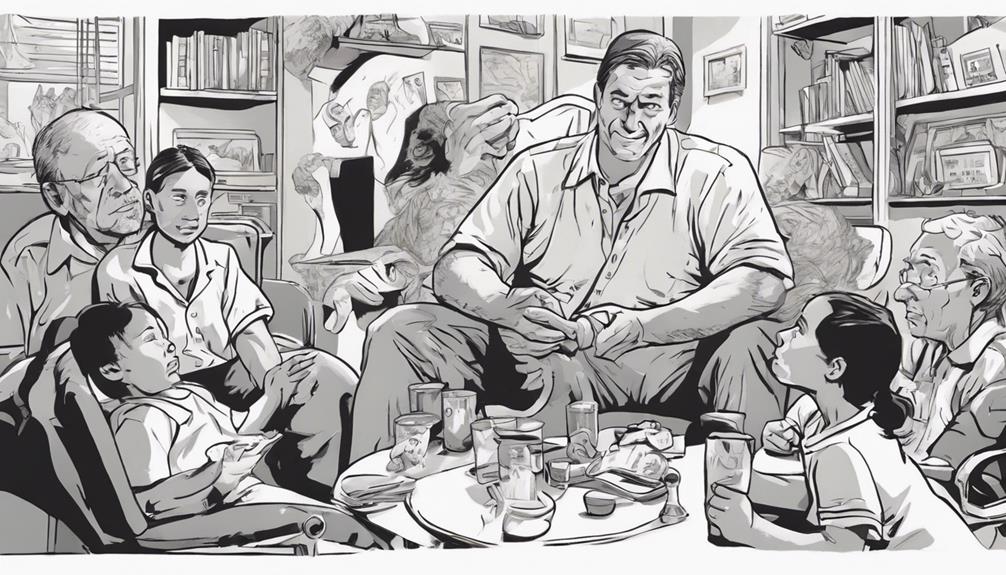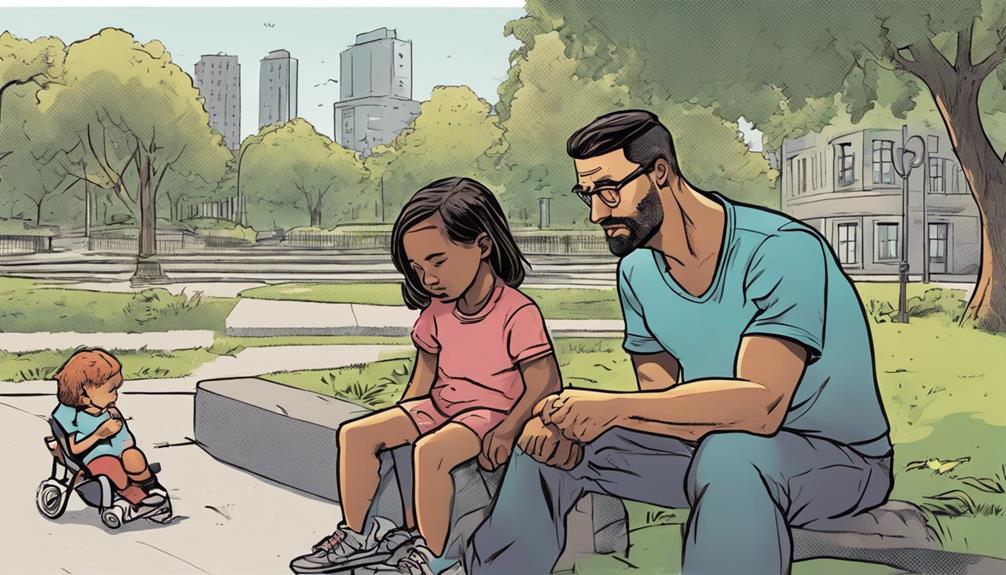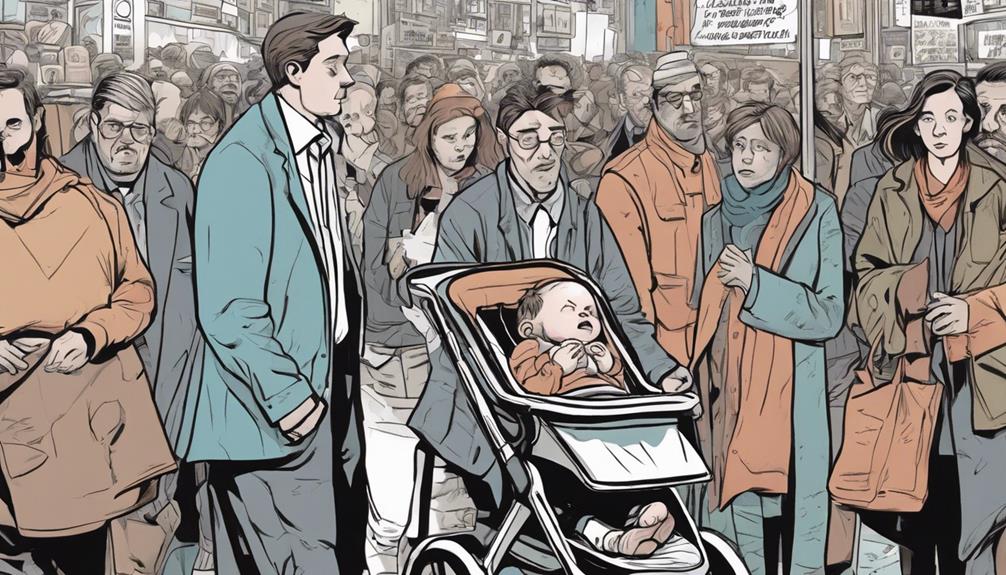Ever felt boxed in by what society expects of you? That’s my daily grind as a dad in charge of our home nest.
Writing to Modern Dads, I’m peeling back the curtain on the life of a male caregiver. It’s 2024, yet here I am, navigating through a maze of outdated stereotypes. Why? Because sharing my story could be the beacon for others paddling in the same boat.
Let’s get real. The image of a man with a mop or a baby isn’t poster material in most parts of the world. My journey kicked off back in 2019, when Sarah landed her dream job in tech. That meant I was up at bat, full-time, juggling duties for Emily and Liam.
Navigating grocery aisles with a tantrum-throwing Liam or mastering Emily’s French braid didn’t come with a manual. But here’s the kicker: the sideways glances and under-the-breath comments did. ‘Babysitting today, huh?’
No, I’m parenting.
Full-time. Full stop.
This is where the rubber meets the road, challenging the narrative that caregiving isn’t masculine.
Real Moments, Real Growth
Just last Tuesday, a moment with Emily smashed the stereotype harder than her smashing her Lego castle. Homework time, and she’s stumped by math – not her favorite. We sat, pencils in hand, breaking down problems into manageable chunks. ‘Dad, you make math feel like a detective game,’ she beamed.
That’s when it hit me. My role isn’t just about the daily grind; it’s about shaping how my kids perceive challenges, learning, and gender roles.
Through Liam’s laughter and Emily’s ‘aha’ moments, Sarah and I are crafting a new narrative. One where dad is as much a caregiver as mom.
And guess what? We’re all the better for it.
Key Takeaways
- Cultural norms and media stereotypes hinder acceptance of male caregiving roles.
- Toxic masculinity perpetuates stigma around men in caregiving roles.
- Stay-at-home dads face judgment due to traditional gender expectations.
- Male caregivers lack tailored support systems, impacting their well-being.
Societal Perceptions of Male Caregiving

Despite advancements in gender equality, societal perceptions of male caregiving remain heavily influenced by traditional gender roles and stereotypes. Cultural norms dictate that caregiving is primarily a female responsibility, leading to public perception issues when men take on caregiving roles. Media portrayal often reinforces these stereotypes, depicting male caregivers as exceptions rather than the norm. This influences workplace dynamics, where male caregivers may face stigma or lack of support when balancing work and caregiving responsibilities.
Addressing these ingrained societal perceptions requires a shift in cultural norms and media representation. By showcasing diverse caregiving roles in a positive light, the media can help reshape public perception and normalize male caregiving. Workplace policies and attitudes also need to evolve to support male caregivers, fostering an environment where they feel valued and empowered to fulfill both their work and caregiving duties. Challenging traditional gender roles and stereotypes surrounding male caregiving is essential for creating a more inclusive and supportive society for all caregivers.
Gender Role Expectations
Gender role expectations shape societal perceptions and behaviors regarding caregiving responsibilities, influencing how individuals approach and fulfill these roles. Toxic masculinity, a concept rooted in traditional gender norms, often portrays caregiving as a task more suited for women, perpetuating the idea that men should be providers rather than nurturers. This notion creates barriers for male caregivers, as they navigate societal expectations that may clash with their desire to actively participate in caregiving roles. Gender stereotypes play a significant role in shaping these expectations, dictating what’s considered appropriate behavior for men and women within family dynamics.
Caregiving norms have long been associated with femininity, leading to the stigmatization of men who choose to prioritize caregiving responsibilities. This stigma can create internal conflict for men, torn between fulfilling their caregiving duties and conforming to societal expectations of masculinity. By challenging these gender role expectations and promoting inclusivity in caregiving roles, we can work towards breaking down harmful stereotypes and creating a more supportive environment for all caregivers.
Stigma Around Stay-at-Home Dads

Stigmatization of stay-at-home dads persistently influences societal perceptions of caregiving roles and challenges traditional gender norms. The challenges faced by stay-at-home dads stem from deeply ingrained societal expectations that place the primary caregiving responsibility on women. This stigma can lead to feelings of inadequacy, isolation, and judgment for men who choose to prioritize caregiving over traditional roles. Changing norms around gender roles have started to shift, but the stigma remains pervasive.
Stay-at-home dads often face criticism and skepticism from those who question their ability to fulfill caregiving duties traditionally associated with mothers. This can create a barrier for men who wish to be actively involved in raising their children and providing care for their families. The lack of support and understanding for stay-at-home dads perpetuates the stigma, making it difficult for men to navigate their caregiving roles confidently.
As societal attitudes continue to evolve, it’s essential to challenge stereotypes and promote inclusivity in caregiving roles. Encouraging open dialogue and breaking down stigmas surrounding stay-at-home dads can help create a more supportive environment for all caregivers, regardless of gender.
Lack of Support for Male Caregivers
A significant lack of adequate support systems for male caregivers hinders their ability to navigate their roles effectively and confidently. In a society where caregiving is often associated with women, societal norms can create barriers for men seeking help in their caregiving responsibilities. This lack of support stems from ingrained stereotypes that dictate caregiving as a predominantly female role, leaving male caregivers feeling isolated and without resources tailored to their needs.
Moreover, family dynamics can further exacerbate the challenges faced by male caregivers. Traditional family structures may assign caregiving responsibilities based on gender roles, overlooking the unique needs and struggles of male caregivers. This can lead to feelings of alienation and inadequacy, as male caregivers may not receive the recognition and assistance they require to fulfill their caregiving duties effectively.
To address this issue, it’s crucial to dismantle societal norms that perpetuate gender stereotypes around caregiving and promote inclusivity in support systems. By recognizing and validating the experiences of male caregivers within the context of family dynamics, we can work towards creating a more supportive environment that empowers all caregivers to navigate their roles with confidence and competence.
Impact on Mental Health

The lack of adequate support for male caregivers can have a significant impact on their mental health, contributing to feelings of isolation and stress. Male caregivers often face a psychological burden due to societal expectations and stereotypes that can lead to increased levels of anxiety and depression.
To address these challenges and enhance their mental well-being, it’s crucial for male caregivers to implement effective coping strategies. Here are some key points to consider:
- Seeking Professional Help: Encouraging male caregivers to seek therapy or counseling can provide them with a safe space to express their emotions and develop healthy coping mechanisms.
- Engaging in Self-Care Practices: Incorporating self-care activities such as exercise, meditation, or hobbies can help male caregivers manage stress and prioritize their emotional well-being.
- Building a Support Network: Establishing connections with other caregivers or support groups can offer valuable social support and reduce feelings of isolation, fostering a sense of community and understanding.
Can Stay-at-Home Dads Overcome Stereotypes and Bias?
Navigating stay-at-home dad stereotypes can be challenging, but with time and effort, these biases can be overcome. By showcasing the valuable role they play in parenting and breaking down traditional gender norms, stay-at-home dads can gain acceptance and recognition for their important contribution to the family unit.
Can Stay-at-Home Dads Break the Stereotypes and Challenge Societal Expectations?
Societal misconceptions about stay-at-home dads are slowly being challenged as more men take on the role of primary caregiver. Breaking traditional stereotypes, these dads are proving that they can excel in nurturing roles, challenge societal expectations, and create a more inclusive environment for all parents.
Can Challenging Stereotypes Help to Improve the Image of Male Caregivers?
Challenging stereotypes can provide valuable insights on male caregivers. By debunking the notion that caregiving is solely a female role, society can recognize and appreciate the important contributions men make in this field. This shift in perception can ultimately improve the image of male caregivers and promote inclusivity.
How Can Fathers Overcome Financial Insecurity Despite Stereotypes About Male Caregivers?
Many tips for fathers facing financial insecurity involve seeking support from community resources or financial assistance programs. By being proactive about budgeting, seeking additional education or training for better job opportunities, and seeking emotional support, fathers can overcome the stereotypes about male caregivers and provide a stable financial future for their families.
Conclusion
Facing stereotypes as a male caregiver is tough. Society expects us to act a certain way, but caring shows strength, not weakness.
I find strength in support and self-care. Breaking free from these molds lets us truly shine.
Have you faced similar challenges? Share your stories below. Help us spread the word by sharing this post. Let’s support each other on Modern Dads.


Leave a Reply